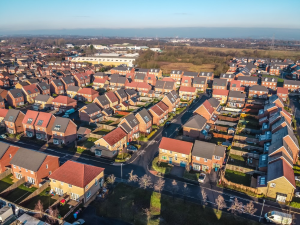
image for illustration: Open Government Licence v3.0
Ombudsman shares over 100 severe maladministration cases on damp and mould ahead of Awaab’s Law to prevent future failings.
The Housing Ombudsman writes:
The Housing Ombudsman has released its latest ‘learning from severe maladministration’ report, focusing on inspections and timeliness within damp and mould complaints. With the important role that social housing has to play in giving safe and secure housing to millions, the learning in these reports should help landlords provide effective services that protect this aspiration. Throughout the report residents’ experienced distress and disruption from damp and mould as landlords responses were delayed, with residents losing the use of bedrooms or belongings, such as sofas, as mould spread, reporting ceilings near collapse and health impacts to them or their children, including asthma and eczema.
The decisions are grouped together to show the organisational risk to the landlord as well as the impact on the resident because of a lack of timeliness around initial inspections, the commencement of works or their completion. Some of these cases concern all three of these delays which would need to be addressed under Awaab’s Law which is proposed for both social and private landlords. It is also important to stress that while this report focuses on findings about damp and mould, these cases often include a wide range of other property condition issues. The Ombudsman has also used this report to show where the redress being offered by landlords for significant and prolonged failings was repeatedly inadequate. For example, one landlord offered just £150 compensation to a family who lived within extensive mould for 5 years, including their bedrooms being uninhabitable, and another proposed £850 for failings in damp and mould for 4 years, despite the huge impact the issues had on a disabled resident. The explanations of the compensation provided in these cases should assist landlords to make consistent payments that are clear, specific and proportionate and help to prevent cases being escalated. The landlords [are]named in the report.
Richard Blakeway, Housing Ombudsman, said: ‘This is a topic that now dominates half of our casework and one coming into sharp focus given the government’s intention to introduce Awaab’s Law into both the social and private rented sectors. It is clear is that landlords are still struggling with timescales. This is despite policies often setting out a clear sequence of actions and existing obligations requiring reasonable resolution times. Throughout these cases landlord inspections are revealed as limited or repeated because of poor records before action is taken, with living conditions deteriorating during these delays. Often there can be a disconnect between the survey recommendations and the schedule of works as these repairs being delayed. Cases also include repairs being ‘completed’ but issues remaining for the resident and cases being closed without follow up inspections or communication with the resident. Together with the human impact, these delays can result in greater costs for the landlord, both in terms of repairs and avoidable redress. Landlords need to reevaluate approaches to compensation using these cases, to embed a fair and reasonable approach within local complaints procedures, which is an expectation of the statutory Complaint Handling Code. It is wholly unreasonable to offer just £150 to a resident who lost both their bedrooms to mould for more than a year, as happened in one case. Moreover, addressing the root causes of inadequate inspections and delays means resources can go into services rather than redressing service failings. We encourage landlords to engage positively with the lessons these cases provide and opportunities through our Centre for Learning. These are invaluable and will help you to provide an improved service for your residents. Read more….
